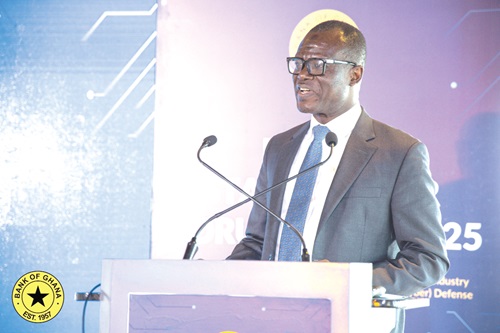The first Deputy Governor of the Bank of Ghana (BoG), Dr Zakari Mumuni, has called for a stronger collaboration between regulated financial institutions and technology service providers to help build a resilient financial ecosystem that can protect against rising cyberattacks.
The collaboration should precede the creation of a robust environment where institutions, regulators, and technology providers commit to a safer and more inclusive financial ecosystem, Dr Mumuni explained.
He said there was a need for a unified ecosystem, where every institution's resilience was interconnected and no one was left behind to collectively secure a stronger future.
The deputy governor maintained that a unified ecosystem had become necessary following the recent increase in cyber and technology-related fraud losses, which had reached GH¢10 million in 2024, up from a GH¢8.9 million record in the previous year.
He made the call at the opening of the Financial Industry Command Security Operations Centre (FICSOC) Stakeholder Forum in Accra yesterday.
The Forum
The forum was attended by players in the industry, including the Cyber Security Authority, Ghana Association of Bankers (GAB), banks, fintechs, and technology providers.
![]()
Participants in the Financial Industry Command Security Operations Centre Stakeholder Forum
It created a platform for stakeholders to share insight into the expansion of the Financial Industry Command Security Operations Centre.
Digital revolution
Dr Mumuni said the resilience of the country’s financial system depended not just on innovation or regulation, but on the willingness to collaborate.
The deputy governor said the digital revolution has transformed the financial system, opening pathways to innovation but also to vulnerability.
In 2023, he said the global financial cyberattacks surged by 38 per cent, while annual money laundering flows exceeded $2 trillion.
“Ghana has not been spared. In 2024, cyber and technology-related fraud losses reached almost GH¢10 million, up from GH¢8.9 million recorded in the previous year, according to the Bank of Ghana’s 2024 Fraud Report.
“Today, we are at a pivotal moment in the evolution of financial services.
As technology advances and our economies become more interconnected, deeper integration within the financial industry is no longer a luxury – it is an imperative,” he said.
He added that integrating platforms and systems across institutions was crucial for delivering seamless services, particularly to reach millions of unbanked Ghanaians and bring them into the formal financial system.
Confronting the risks
Dr Mumuni explained that as industry players embrace the promise of digital inclusion, there is a need to confront the risks it brings, particularly in the realm of cybersecurity.
He said every new doorway to financial empowerment could also become an entry point for malicious actors.
Cyber risks are unlike any other.
They are stealthy, adaptive, and borderless.
A single weakness in one institution can cascade into systemic threats, amplified by the very interconnectedness we rely upon for efficiency and scale.
“A breach in one part of our financial ecosystem could compromise operations, security, and the privacy of stakeholders across multiple institutions — regulators, partners, vendors, and customers alike,” he said.
Not optional
He said collaboration was not optional because no single institution, no matter how large or well-resourced, could face these threats alone.
“We must share intelligence, align standards, and develop resilient systems to protect the integrity of our industry and the trust of those we serve.
“The Bank of Ghana has long recognised this imperative.
Over the years, the bank has made significant investments in cybersecurity, not simply for compliance, but to build a foundation of trust and resilience for collective progress,” he added.
FICSOC
He said a cornerstone of this effort was the 2018 issuance of the Cyber and Information Security Directive (CISD)— a bold step to establish clear expectations, strengthen accountability, and harmonise cybersecurity standards across the financial sector.
He said the directive helped institutions move from reactive postures to proactive strategies, enabling them to anticipate and respond to emerging threats.
“This led to the establishment of the Financial Industry Command Security Operations Centre, which has greatly enhanced our collective situational awareness.
“Participating institutions can now monitor threats in real time, share incident reports promptly, and coordinate responses with greater speed and impact.
It is a living example of how collaboration breeds resilience.
Indeed, when we work together, we are stronger, smarter and faster,” he added.

